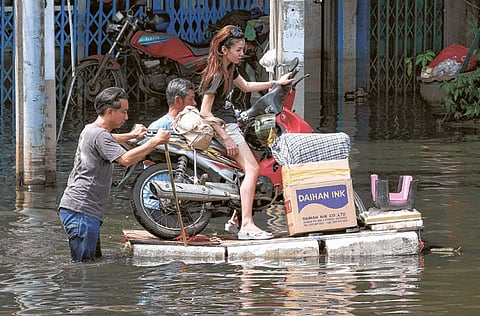Floating garbage, sewage raise disease risk in Bangkok floods
Biggest health threats feared after moving floodwaters subside

Bangkok: Rancid brown water licks at Samroeng Verravanich's thighs as he wades through one of Bangkok's many flooded streets. The garbageman plunges a white-gloved hand into the filth, fishes out a slimy plastic bag and slings it into the red basket he's towing.
"If you have cuts, it can create infections between your fingers," Samroeng says of the dirty water, holding out a dripping hand peppered with a red rash. "My hands got infected. It hurts and it spreads too — like a virus."
Plastic bags overflowing with waste and rotten food cling to boats, cars, motorbikes and people as they slowly snake through inundated roadways. Raw sewage and animal carcasses can be seen bobbing in waters ripe for disease.
No major outbreaks have been reported since monster monsoon rains spawned floods that began swallowing areas north of the capital in August. But experts warn the biggest health threats will likely emerge in the coming weeks after moving floodwaters subside, leaving stale pools.
Sanitation issues
"There's a lot of danger around it," says Mark Thomas, a spokesman for Unicef, which is assisting with sanitation issues. "You need to keep kids out of the water, and everybody should stay out of the water as much as possible."
Mosquito-borne diseases, such as dengue fever, are a concern as well as eye infections and water-borne ailments that can lead to diarrhoea and severe dehydration.
Skin diseases and fungal infections are the flood's biggest plague so far, with nearly 100,000 cases of athlete's foot reported. Bouts of diarrhoea and respiratory infections are also common.
Some 110,000 people have been displaced and more than 400 killed, mostly from drowning. Many submerged homes no longer have running water or working toilets, forcing remaining residents to bathe and defecate in the open, often in waters surrounding their homes. That waste can be spread into water where children play.
"We all know the risk is there," says Dr Maureen Birmingham, World Health Organisation country representative in Thailand. "People get water in their mouths that's contaminated with faeces, and all the diseases that can ensue from that — that's probably the biggest concern."
Since garbage trucks can no longer reach many hard-hit areas, brigades of trash collectors have started doing the work in boats or on foot.
On the same street where Samroeng and a colleague cleared rubbish in the northwestern Bangkok district of Bang Plad, nine-year-old Paradorn Junsamlee practised swimming behind his mum.
"I'm worried about him getting sick, but you can't stop him," says mother Nantana Junsamlee. "I tell him, ‘Every time you swim, you have to avoid getting water in your eyes and mouth'."
Fast-rising waters
At a Buddhist temple down a nearby side street, dozens of stranded flood victims waited for a doctor to arrive by boat. One elderly woman says fast-rising waters forced her to flee without her diabetes medication. Another needed an injection for anaemia.
Outside, two other flood threats were visible — a 6-foot (2-metre) python held in a garbage can after it was caught near the shelter, and a fat 6-inch (15-cm) leech scorched on the temple's marble stairs by a cigarette lighter.
Thailand has a robust health infrastructure that extends from top-notch Bangkok hospitals that draw foreign medical tourists to an army of 900,000 community health workers who serve their neighbours in even the most remote villages. Childhood vaccination rates are high, which helps prevent fast-spreading diseases such as measles.
But even with all of that built-in support, Dr Wiwat Wiriyakijja of Thailand's Health Ministry says he worries the worst may be yet to come.


